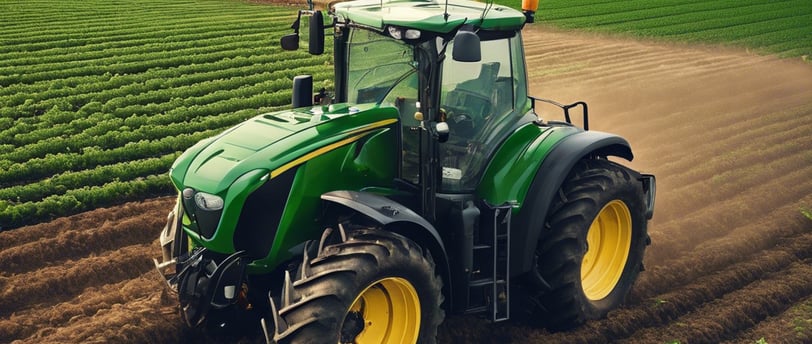How AI is Reducing Environmental Impact in Farming
Learn how AI is helping to reduce the environmental impact of farming by optimizing resources, minimizing waste, and promoting sustainable agricultural practices.
AI TOOL
Elevate
9/28/20244 min read


Introduction: The Environmental Challenges of Modern Farming
Agriculture has long been a major contributor to environmental degradation, from deforestation to excessive water use and chemical runoff. However, the rise of AI in agriculture is changing the game. By using AI-powered tools, farmers can adopt more sustainable practices, reduce their environmental footprint, and help ensure a greener future.
---
AI-Powered Precision Farming
One of the primary ways AI is reducing the environmental impact of farming is through precision agriculture. This technology enables farmers to monitor their fields in real-time and make data-driven decisions, minimizing waste and maximizing efficiency.
1. Optimizing Water Use
Water is one of the most critical resources in agriculture, but traditional farming methods often lead to over-irrigation. With AI-powered irrigation systems, farmers can optimize water use based on real-time data, such as soil moisture levels and weather patterns. This not only conserves water but also prevents issues like soil erosion and nutrient runoff, making farming more sustainable.
2. Reducing Fertilizer and Pesticide Use
AI can also analyze data from drones and sensors to detect pests or nutrient deficiencies in specific areas of a field. Farmers can then apply fertilizers or pesticides only where they are needed, reducing the overall use of these chemicals. By using less fertilizer and pesticide, AI helps mitigate harmful runoff into nearby water bodies and reduces the chemical burden on ecosystems.
---
AI-Driven Sustainable Crop Management
AI is also transforming how crops are managed, ensuring that farmers can meet growing food demands without compromising the environment.
1. Improving Soil Health
Healthy soil is the foundation of sustainable agriculture. AI systems can monitor soil conditions and provide recommendations on how to improve soil health, such as by adjusting irrigation, adding organic matter, or rotating crops. This helps preserve soil fertility and prevents degradation over time.
2. Carbon Sequestration through AI
AI can be used to identify and manage crops that are particularly effective at carbon sequestration—the process of capturing and storing atmospheric carbon dioxide. By promoting the growth of these crops and managing them through AI-driven systems, farmers can help reduce their carbon footprint and mitigate climate change.
3. Minimizing Food Waste
AI tools can also reduce food waste by accurately predicting crop yields and identifying optimal harvesting times. This ensures that crops are harvested at their peak, reducing spoilage and minimizing waste. Moreover, AI-powered logistics systems can optimize the transportation and storage of produce, further cutting down on food loss.
---
AI in Reducing Greenhouse Gas Emissions
Another significant contribution of AI in agriculture is its ability to reduce greenhouse gas (GHG) emissions, a major driver of climate change.
1. Reducing Fuel Consumption
AI-powered autonomous farming equipment can operate more efficiently than traditional machinery. These autonomous tractors and harvesters use advanced algorithms to minimize fuel consumption, reducing the overall carbon footprint of farming operations.
2. Sustainable Livestock Management
Livestock farming is a significant source of methane emissions, a potent greenhouse gas. AI is helping farmers manage livestock more sustainably by monitoring feed, health, and breeding practices. By optimizing these factors, AI can help reduce methane emissions and improve the overall efficiency of livestock production.
---
Real-World Examples of AI in Sustainable Agriculture
Several AI-driven solutions are already making a difference in reducing the environmental impact of farming:
1. John Deere's Precision Farming Solutions
John Deere has developed AI-powered machinery that enables precision planting, harvesting, and irrigation. These tools help farmers optimize resource use and minimize waste, contributing to more sustainable farming practices.
2. Planet Labs' Satellite Monitoring
Planet Labs uses satellite imagery and AI algorithms to provide real-time insights into crop health, water use, and soil conditions. This data allows farmers to make informed decisions that reduce resource waste and environmental harm.
3. Blue River Technology
Blue River Technology’s AI-driven "See & Spray" system uses computer vision to identify weeds and apply herbicides only where necessary, significantly reducing chemical use and promoting environmentally friendly farming.
---
The Future of AI in Sustainable Agriculture
The future of AI in sustainable agriculture is bright, with several emerging trends likely to shape the industry in the coming years:
1. AI and Vertical Farming
Vertical farming, which involves growing crops in stacked layers indoors, is set to benefit greatly from AI. By controlling variables like light, temperature, and nutrient levels, AI can help optimize crop growth in urban environments with minimal environmental impact.
2. AI for Climate-Resilient Crops
AI can help develop crops that are more resistant to climate change by analyzing data on soil conditions, weather patterns, and genetic traits. These crops will be better equipped to withstand extreme weather conditions, reducing the need for resource-intensive interventions.
3. AI in Regenerative Agriculture
Regenerative agriculture, which focuses on restoring soil health and biodiversity, is another area where AI is expected to play a crucial role. By analyzing data from soil sensors, AI can help farmers adopt regenerative practices that promote long-term environmental sustainability.
---
Conclusion: AI is Paving the Way for Sustainable Farming
The integration of AI tools in agriculture is revolutionizing the industry by reducing resource waste, promoting sustainable practices, and helping farmers minimize their environmental impact. As AI technology continues to advance, its role in creating a more sustainable and efficient agricultural system will only become more critical.
Call to Action: Want to make your farm more sustainable? Explore the latest AI tools and learn how they can help you reduce your environmental footprint while boosting productivity!
---
This blog is designed to target farmers, agricultural enthusiasts, and those interested in sustainability by providing valuable insights into how AI can drive positive environmental change
